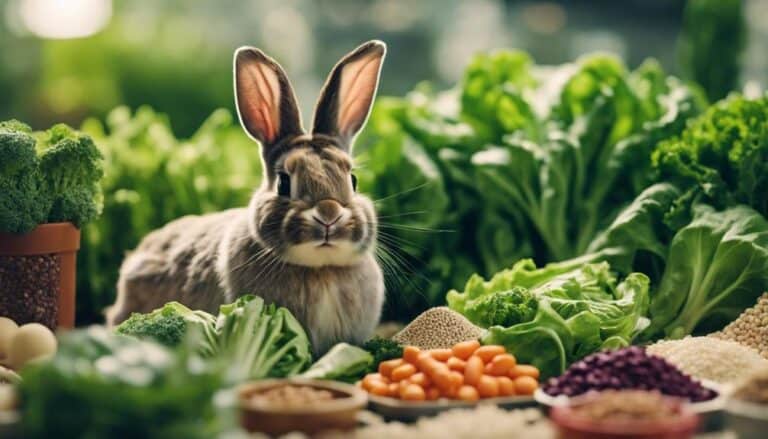If you think tossing a carrot or two to your bunny is enough for weight management, think again. A balanced bunny diet plays a vital role in maintaining their weight, but the reasons go beyond just the scale.
Making smart choices in what goes into your bunny's bowl can impact their energy levels, digestive health, and even their lifespan.
So, buckle up and discover the secrets behind why a balanced bunny diet is essential for weight management.
Contents
- 1 Key Takeaways
- 2 Importance of a Balanced Bunny Diet
- 3 Nutritional Requirements for Bunnies
- 4 Role of Fiber in Weight Management
- 5 Protein Intake for Healthy Weight
- 6 Essential Vitamins and Minerals for Bunnies
- 7 Monitoring Food Portions for Bunnies
- 8 Impact of Treats on Bunny Weight
- 9 Adjusting Diet as Bunnies Age
- 10 Frequently Asked Questions
- 11 How Does a Balanced Diet Impact Bunny Weight Management?
- 12 Conclusion
Key Takeaways
- Balanced bunny diet maintains healthy weight, prevents obesity, and monitors calorie intake.
- Fiber and protein in diet promote satiety, muscle development, and metabolic functions.
- Essential vitamins and minerals support growth, immunity, and overall vitality.
- Monitoring food intake, treats, adjusting diet, and proactive feeding prevent weight issues and digestive problems.
Importance of a Balanced Bunny Diet
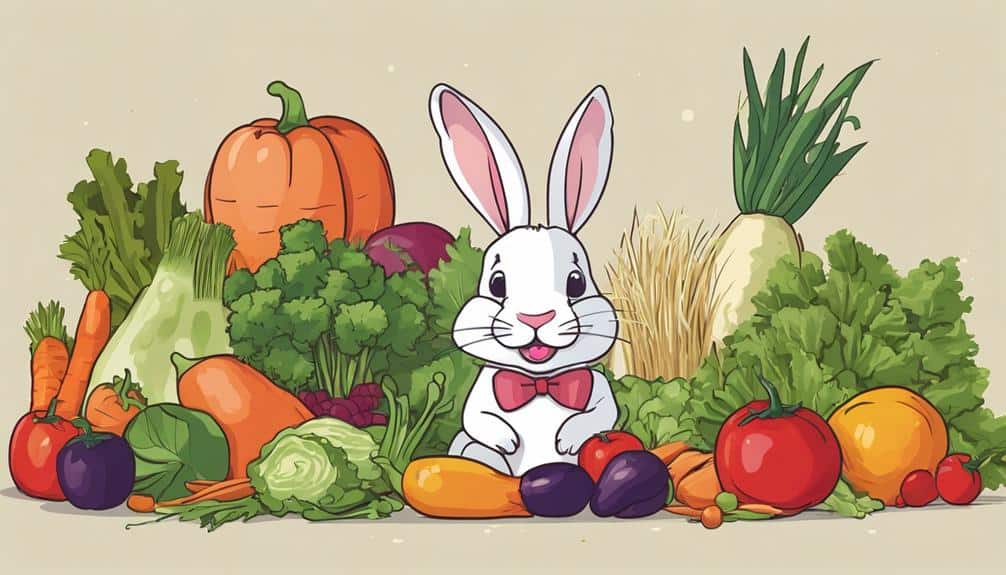
To understand the significance of a balanced bunny diet for weight management, consider how nutrition impacts your rabbit's overall health and well-being. A well-rounded diet plays an important role in maintaining your bunny's weight at a healthy level, preventing obesity-related health issues such as heart disease and arthritis.
By carefully monitoring your rabbit's calorie intake and incorporating low-calorie vegetables into their meals, you can help them stay fit and active. Implementing a structured feeding schedule guarantees that your bunny receives the right amount of food each day, preventing overeating and weight gain. This approach not only supports weight management but also promotes your rabbit's overall well-being.
Nutritional Requirements for Bunnies
Ensuring your bunny's prime health and weight management relies on meeting their specific nutritional requirements. Rabbits require a diet high in fiber, ideally between 20-25%, to aid in digestion and prevent obesity. Additionally, protein intake should fall within the range of 12-16% for best health and weight management in these furry companions.
Providing timely access to hay, fresh vegetables, and limited pellets is essential for maintaining a healthy weight in bunnies. Monitoring their caloric intake and avoiding high-calorie treats are key steps for effective weight management in rabbits.
A balanced bunny diet, complete with appropriate levels of vitamins and minerals, is key to preventing weight-related health issues and ensuring overall well-being. By adhering to these nutritional requirements, you can support your bunny's health and help them maintain an ideal weight.
Role of Fiber in Weight Management
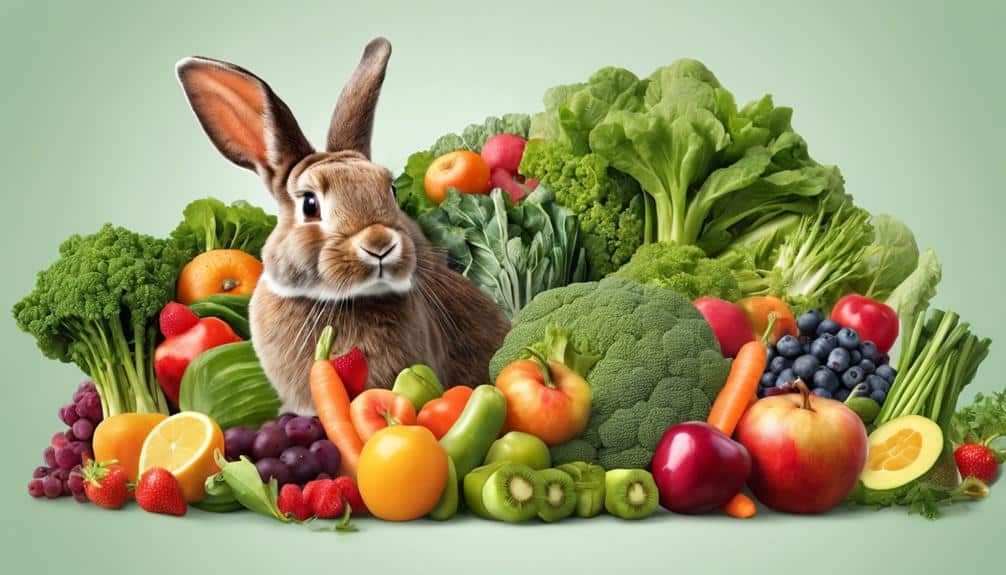
Fiber-rich foods like hay and leafy greens play an important role in managing weight for rabbits by promoting satiety and regulating digestion. Including these in your rabbit's diet can aid in weight management effectively. Here are some key points to contemplate:
- Promotes Satiety: Fiber helps your rabbit feel full for longer periods, reducing the chances of overeating and supporting weight control.
- Regulates Digestion: High-fiber foods like hay and leafy greens assist in maintaining a healthy digestive system, preventing issues like obesity.
- Prevents Obesity: A fiber-rich diet guarantees proper gut motility, essential for managing weight and preventing obesity in rabbits.
Protein Intake for Healthy Weight
Shifting from the role of fiber in weight management, consider the significance of protein intake for maintaining a healthy weight in rabbits.
Protein intake plays an important role in bunnies' overall health, supporting muscle development and essential metabolic functions. To keep your bunnies at a healthy weight, make sure their diet includes 12-16% protein, aiding in growth and vitality. By incorporating protein sources like hay, pellets, and leafy greens, you provide the necessary building blocks for their well-being.
Not only does adequate protein intake help with muscle development, but it also contributes to a feeling of fullness, reducing the chances of overeating. Monitoring your bunnies' protein intake is key to effective weight management, preventing any deficiencies or excesses that could harm their health. Remember, a balanced diet rich in protein is a fundamental aspect of keeping your bunnies healthy and happy.
Essential Vitamins and Minerals for Bunnies

You need to make sure your bunny's diet includes key nutrients like vitamins A, D, E, and B complex to support their overall health. Essential minerals such as calcium, phosphorus, and magnesium are important for your bunny's bone strength and metabolic functions.
Providing the right balance of vitamins and minerals in their diet is essential for preventing deficiencies and promoting best growth.
Key Bunny Nutrients
To guarantee top health and well-being in bunnies, it's essential to provide them with a balanced diet rich in key nutrients, including essential vitamins and minerals. Essential nutrients such as vitamins A, D, E, and B complex play an important role in supporting overall health and well-being in bunnies.
Adequate levels of calcium, phosphorus, and magnesium are necessary for maintaining bone health and muscle function. Proper nutrition not only helps prevent deficiencies but also promotes a strong immune system in bunnies. Ensuring your bunny's diet is balanced and includes these essential vitamins and minerals is key to their longevity and vitality.
- Vitamins A, D, E, and B complex
- Calcium, phosphorus, and magnesium
- Strong immune system
Vital Minerals for Bunnies
Ensuring your bunny receives adequate intake of important minerals like calcium, phosphorus, and magnesium is essential for supporting their bone health, muscle function, and overall well-being. Calcium plays a vital role in maintaining strong bones, muscles, and nerves in rabbits. Phosphorus is critical for energy metabolism, cell growth, and proper bone development. Magnesium aids in muscle and nerve function, contributing to overall well-being and bone health.
Additionally, vitamin A supports vision, immune function, and skin health in bunnies. Vitamin D is essential for regulating calcium and phosphorus levels, critical for bone health and overall growth. By incorporating these critical minerals and vitamins into your bunny's diet, you can help ensure their well-being and vitality.
Important Vitamins for Rabbits
Incorporating essential vitamins and minerals into your bunny's diet is important for maintaining their overall health and well-being.
- Vitamins A, D, and E are vital for maintaining healthy vision, skin, and immune function in rabbits.
- Vitamin B complex aids in energy metabolism, nerve function, and overall well-being of rabbits.
- Adequate levels of calcium are essential for strong bones and teeth in rabbits.
Ensuring your rabbit's diet is high in fibre from fresh vegetables can help regulate their body weight and support a healthy digestive system. Remember, a balanced intake of vitamins and minerals, particularly focusing on calcium levels, is key to promoting your bunny's optimum health and well-being.
Monitoring Food Portions for Bunnies
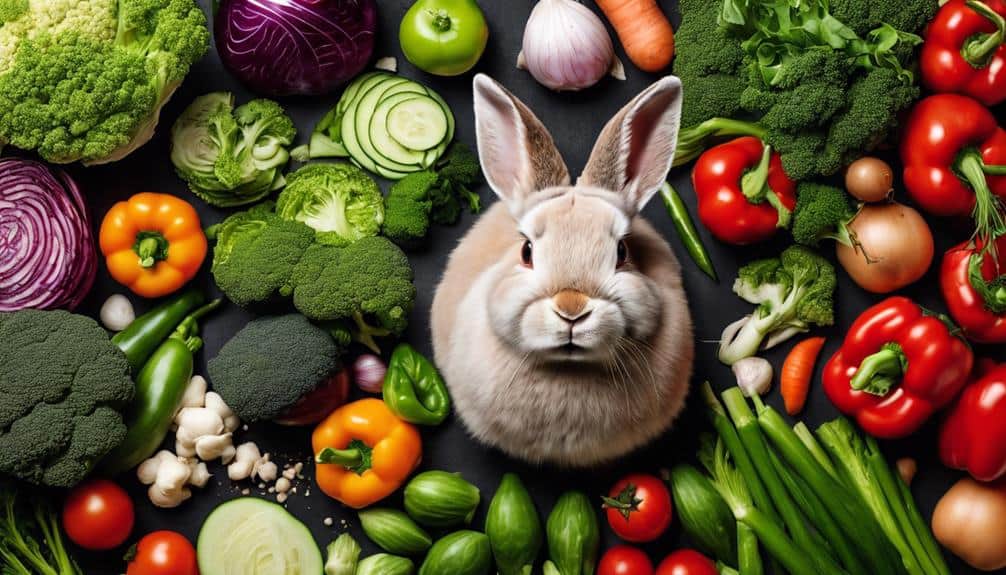
When it comes to monitoring food portions for your bunny, remember the importance of portion size, feeding frequency, and accurate food measuring techniques.
Using a dedicated measuring cup for pellets can help you control calorie intake and prevent overfeeding.
Implementing a strict feeding schedule will assist in regulating food intake and maintaining a balanced diet for weight management.
Portion Size Importance
Monitoring food portions for bunnies is essential for maintaining their healthy weight and preventing overfeeding. Here are some key points to contemplate when it comes to portion size for your bunny:
- Proper portion control helps regulate calorie intake and prevents obesity in rabbits.
- Measuring food accurately with a dedicated cup guarantees consistent portion sizes for bunnies.
- Monitoring food portions allows for adjustments based on individual bunny needs and activity levels.
Feeding Frequency Guide
To guarantee peak health and weight management for your bunny, consider establishing a structured feeding schedule based on their dietary needs and activity levels. Make sure your bunny's daily diet includes fresh vegetables, but remember they should be fed in limited quantities. Fresh vegetables are high in calcium, so caution is key to prevent any potential digestive problems.
By monitoring the feeding frequency and portion sizes, you can effectively manage your bunny's weight and overall health. Adjusting the food portions based on your bunny's individual requirements will help prevent overfeeding and maintain a balanced diet.
This proactive approach to feeding will contribute to your bunny's well-being and happiness.
Food Measuring Techniques
To accurately portion out your rabbit's food, utilize a dedicated measuring cup. When monitoring your bunny's food portions, consider the following techniques:
- Weigh fresh vegetables: Measure the amount of fresh vegetables to guarantee your bunny receives a balanced diet that's high in nutrients.
- Control high-calorie foods: Be mindful of foods that are high in calories and adjust portion sizes accordingly to manage your bunny's weight effectively.
- Serve in small amounts daily: Offer food in small, measured quantities throughout the day to prevent overfeeding and maintain a healthy weight for your bunny.
Impact of Treats on Bunny Weight
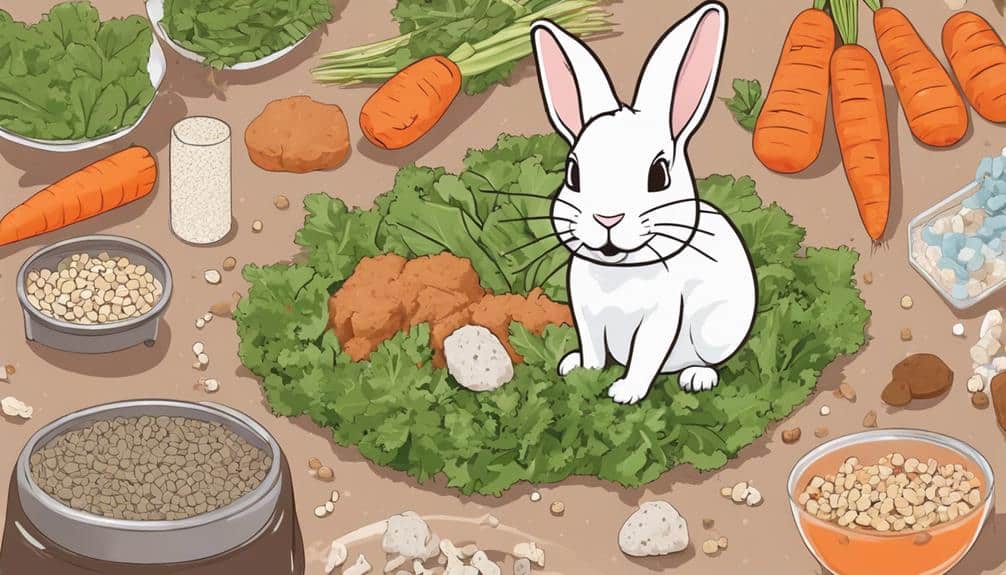
Indulging your bunny in treats high in sugar and fat can greatly impact their weight. Excessive consumption of high-calorie treats can lead to obesity and various health issues in bunnies.
To support weight loss and prevent obesity, it's essential to monitor your bunny's treat intake. Instead of high-calorie options, consider offering fresh vegetables as treats, which should always be available. By choosing low-calorie treat alternatives, you can help manage your bunny's weight effectively.
Adjusting Diet as Bunnies Age
As bunnies age, their dietary needs evolve to support their changing metabolism and health requirements. Here are some key points to contemplate when adjusting your bunny's diet as they grow older:
- Growing Rabbits: Teenage rabbits (7 weeks to 7 months) should have unlimited access to alfalfa-based pellets and timothy hay to support their growth and development.
- Mature Adult Rabbits: From 1 to 5 years old, mature adult rabbits need unlimited timothy hay, adjusted pellets based on metabolism, and at least 2 cups of chopped veggies per six pounds of body weight.
- Senior Rabbits: For rabbits over 6 years old, senior rabbits may require maintenance of the adult diet if weight is stable, with frail rabbits possibly needing unrestricted pellets based on vet recommendations.
Frequently Asked Questions
Why Is a Balanced Diet Important for Rabbits?
You need a balanced diet for your bunny because it meets their nutritional needs, supports digestive health, boosts energy levels, maintains muscles, prevents deficiencies, and helps them maintain a healthy weight. It's essential for their well-being.
What Is the Importance of Feeding Rabbits Regularly?
In your bunny's world, daily feeding is like a comforting hug, setting a rhythm that keeps their energy hopping. A consistent schedule guarantees balanced nutrition, proper portioning, healthy treats, and regular exercise for their well-being.
How Can Rabbits Prevent Obesity?
To prevent obesity, establish an exercise routine, control portions, offer low-cal treats, provide high-fiber pellets, fresh greens, and increase hay consumption. Your bunny's health and happiness depend on these habits for a fit life.
What to Do if My Rabbit Is Overweight?
If your rabbit is overweight, focus on exercise routines, dietary restrictions, portion control, weight loss, vet consultations, and monitoring progress. Implement gradual changes, seek vet advice, track food intake, encourage movement, and tailor strategies to your rabbit's needs.
How Does a Balanced Diet Impact Bunny Weight Management?
A balanced diet is crucial for bunny weight management. Ensure they have a good mix of hay, fresh veggies, and a small amount of pellets. Limit treats and monitor portion sizes. Regular exercise is also essential. Follow these bunny weight management tips for a healthy and happy bunny.
Conclusion
To sum up, maintaining a balanced bunny diet is essential for managing weight and promoting overall health in rabbits.
By providing the right combination of hay, vegetables, and pellets, you can help your furry friend stay fit and happy.
Remember, a healthy bunny is a happy bunny!
So, keep an eye on their food intake, limit those sugary treats, and watch them hop their way to a long and healthy life.






